Point-of-care ultrasound (POCUS) has become an invaluable skill for residents across various specialties. However, incorporating hands-on ultrasound training into residency curricula can be challenging.
The UpScan platform – developed by the Global Ultrasound Institute (GUSI) – offers an innovative solution. UpScan’s integrated suite of tools (ScanHub, ScanOne, ScanVault, and SageAI) is helping U.S. residency programs modernize ultrasound education and improve trainee competency. Programs ranging from large health systems to community hospitals have adopted UpScan to provide structured learning, real-time feedback, and robust performance tracking for their residents . This blog explores how UpScan is enhancing residency training, with examples from Swedish Health and Eastern Connecticut Health Network, and how in-person ultrasound courses can be extended through the platform.
A POCUS Education Ecosystem: What is UpScan?
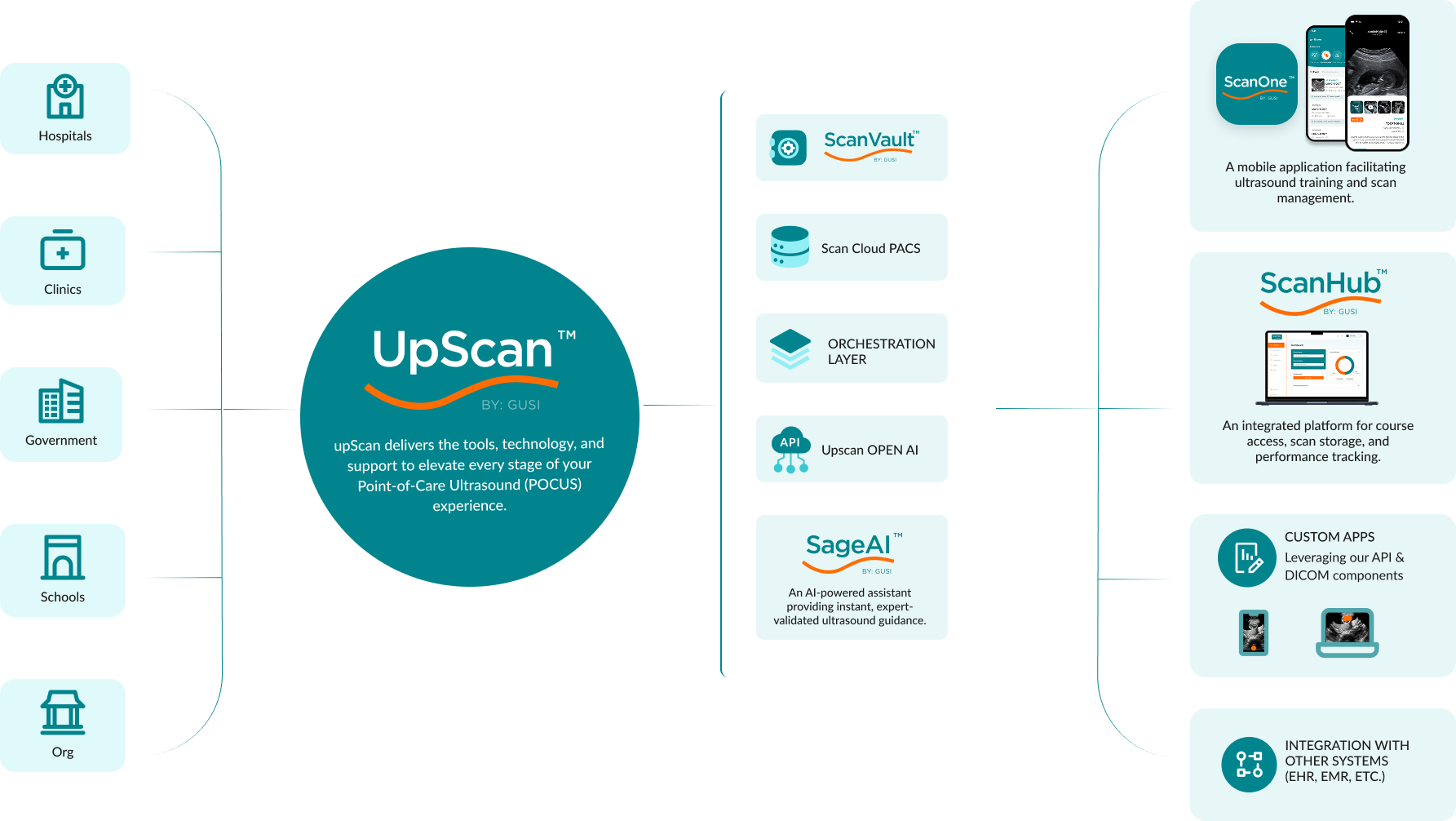
UpScan (available via UpScan.com) is a comprehensive POCUS learning ecosystem that combines online modules, mobile scanning apps, cloud archives, and AI assistance. It is designed to support learners at every stage of their ultrasound journey . In fact, GUSI includes the full ScanHub suite with every membership – providing access to course content, the SageAI assistant, personal scan portfolios, performance dashboards, and more . The platform is cloud-based and device-agnostic, meaning residents and faculty can access it on computers or mobile devices anywhere in the hospital or clinic. Below is an overview of each component in the UpScan suite and how it contributes to ultrasound education:
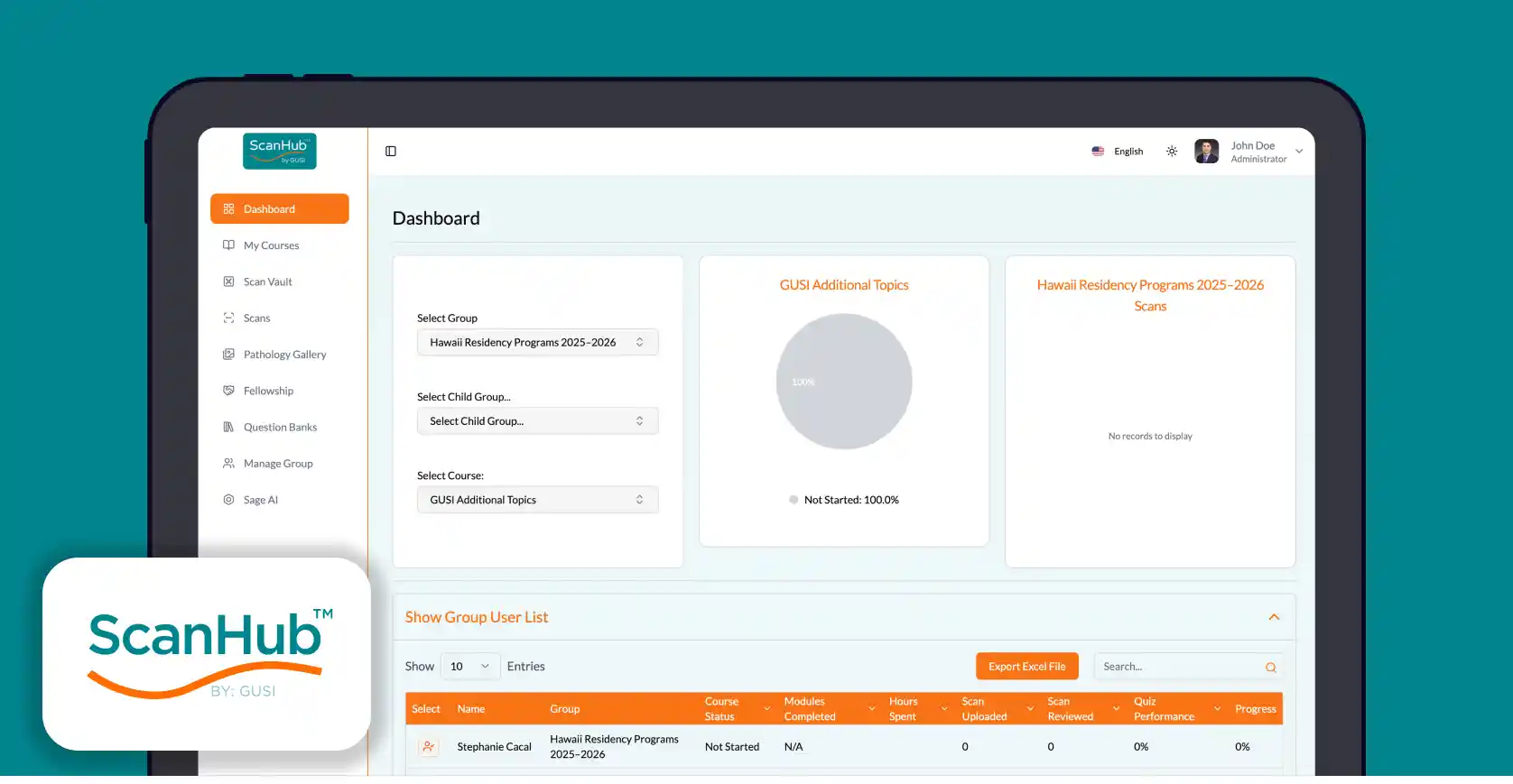
ScanHub: A central online hub that hosts educational modules, assignments, quizzes, and user dashboards. ScanHub is essentially a one-stop curriculum management system for POCUS. Residency directors can assign modules or cases to trainees and monitor their progress. Every GUSI/UpScan user gets access to a library of courses (e.g. POCUS Essentials) through ScanHub . The platform tracks completion of these assignable modules and records competency milestones. ScanHub also integrates other tools (like SageAI and scan portfolios) into a unified interface. In essence, ScanHub functions as the classroom, enabling asynchronous learning and standardized curriculum delivery.
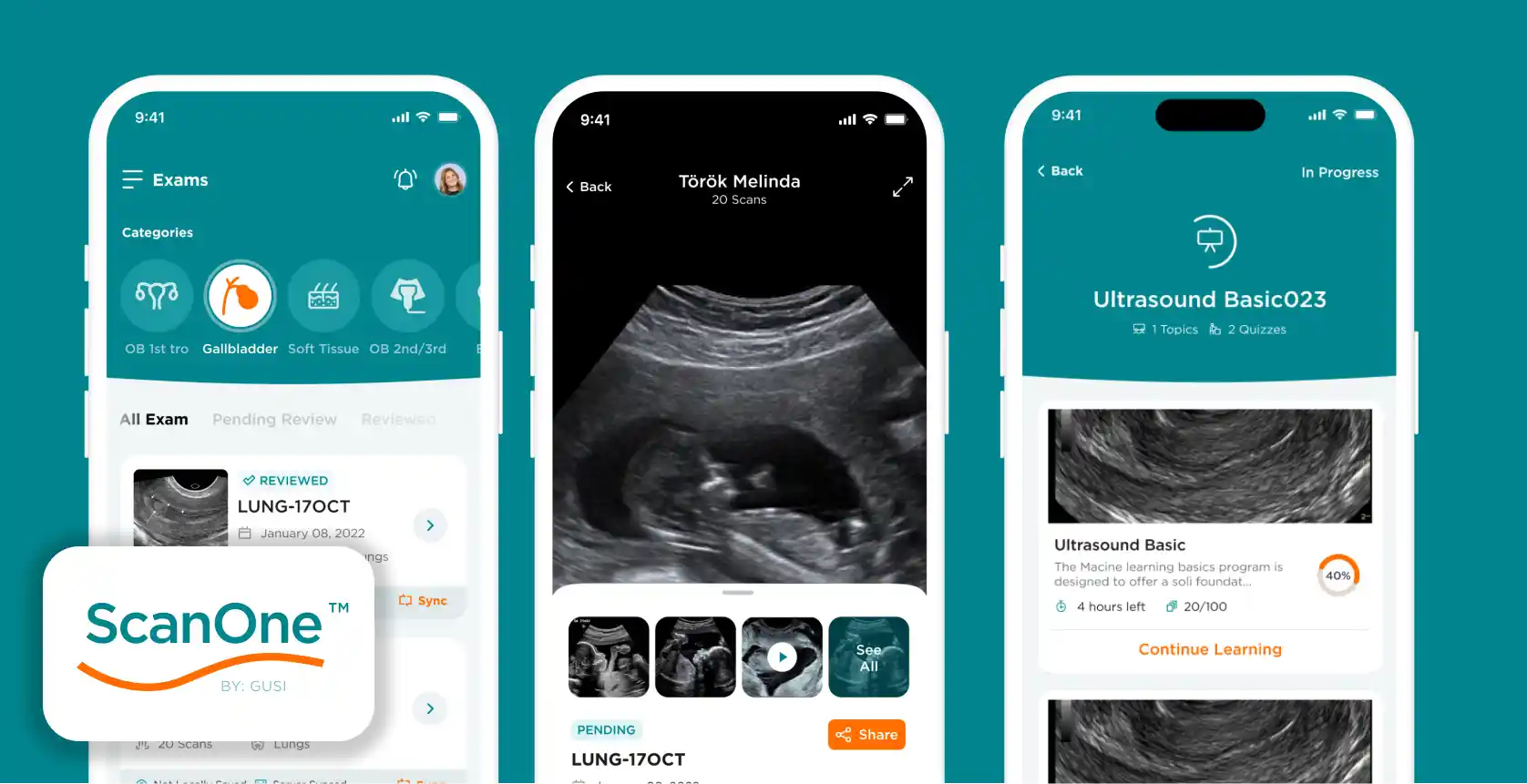
ScanOne: A companion mobile app (iOS and Android) that makes it easy to capture and upload ultrasound scans in the field . With ScanOne, residents can perform scans on actual patients and then anonymize and securely upload images/clips directly to the cloud for later review . This seamless upload process means hands-on learning is continually integrated with the curriculum – every scan a resident performs can become a learning case. The app supports offline use and automatically syncs when connected , which is great for emergency or rural settings. ScanOne effectively serves as a digital logbook, allowing trainees to document studies for credentialing (for example, tracking the number and type of scans performed to meet emergency or family medicine ultrasound proficiency requirements ). It also enables residents to share scans with faculty or mentors in real time for feedback .
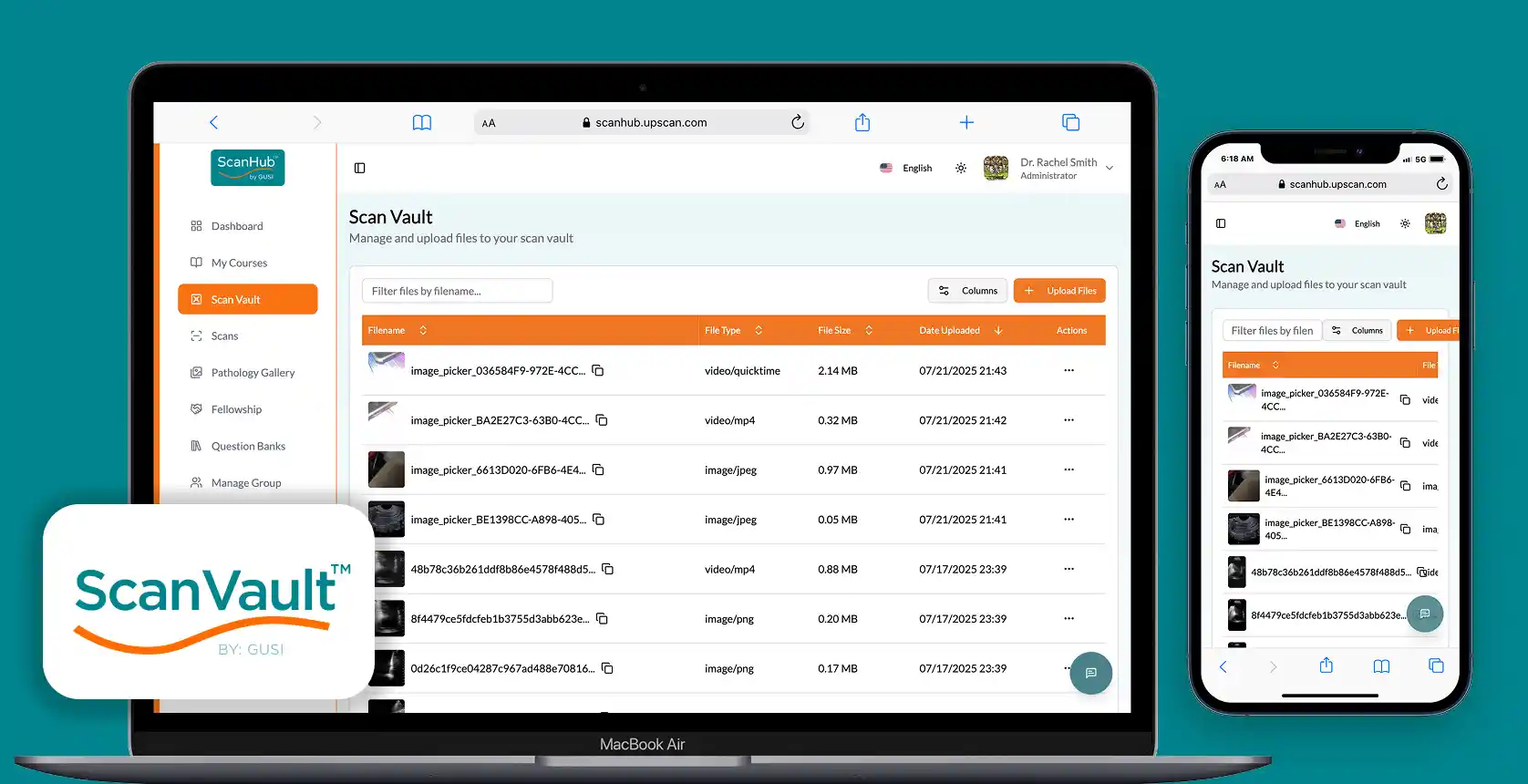
ScanVault (scanFolio): All scans uploaded via the app or platform are stored in a secure cloud archive – this is the role of ScanVault, sometimes referred to as the user’s scan “folio” or portfolio . The ScanVault is a HIPAA-compliant, encrypted repository where images and clips are saved for review and credentialing purposes. Residents and instructors can organize and annotate these scans, creating a verified scan logbook that documents the resident’s ultrasound experience . For example, a resident can tag scans by anatomy or diagnosis and later export a summary for hospital credentialing committees . Program directors benefit from this archive by being able to curate and review team-submitted scans for quality assurance (QA) and feedback . Importantly, UpScan’s data security meets healthcare privacy standards (HIPAA, GDPR, etc.), so patient information is protected in the ScanVault . In short, ScanVault provides a long-term memory for the residency’s POCUS training – every scan can be revisited for teaching or proof of competency.
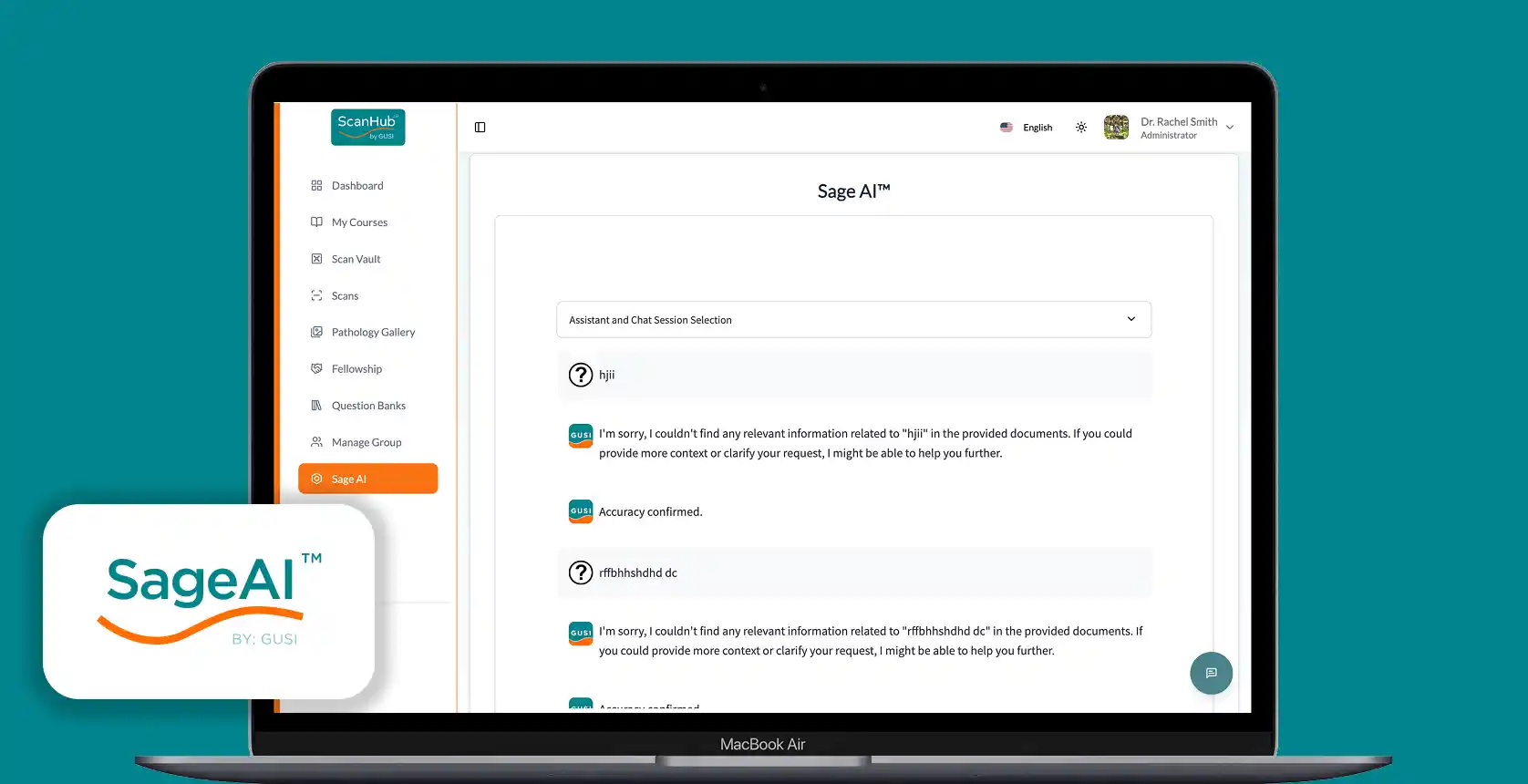
SageAI: One of the most unique features of UpScan is SageAI, an artificial intelligence-powered assistant for ultrasound learning. Integrated into ScanHub, SageAI allows users to ask any ultrasound-related question and get on-demand answers derived from validated expertise . This is like having a 24/7 ultrasound mentor available. For instance, a resident struggling to interpret a cardiac view can query SageAI for tips, or ask about diagnostic criteria for a FAST exam. SageAI provides real-time coaching and answers that complement what residents learn from faculty . In addition, UpScan is developing AI-driven feedback for live scans – such as intelligent suggestions on probe placement or image optimization during an exam . By leveraging AI, the platform accelerates learning: residents get immediate guidance and can clarify doubts anytime, which reinforces their confidence. SageAI essentially helps “teach the teacher” by making sure that even outside of scheduled teaching sessions, learners have support at their fingertips.
A POCUS Education Ecosystem: What is UpScan?
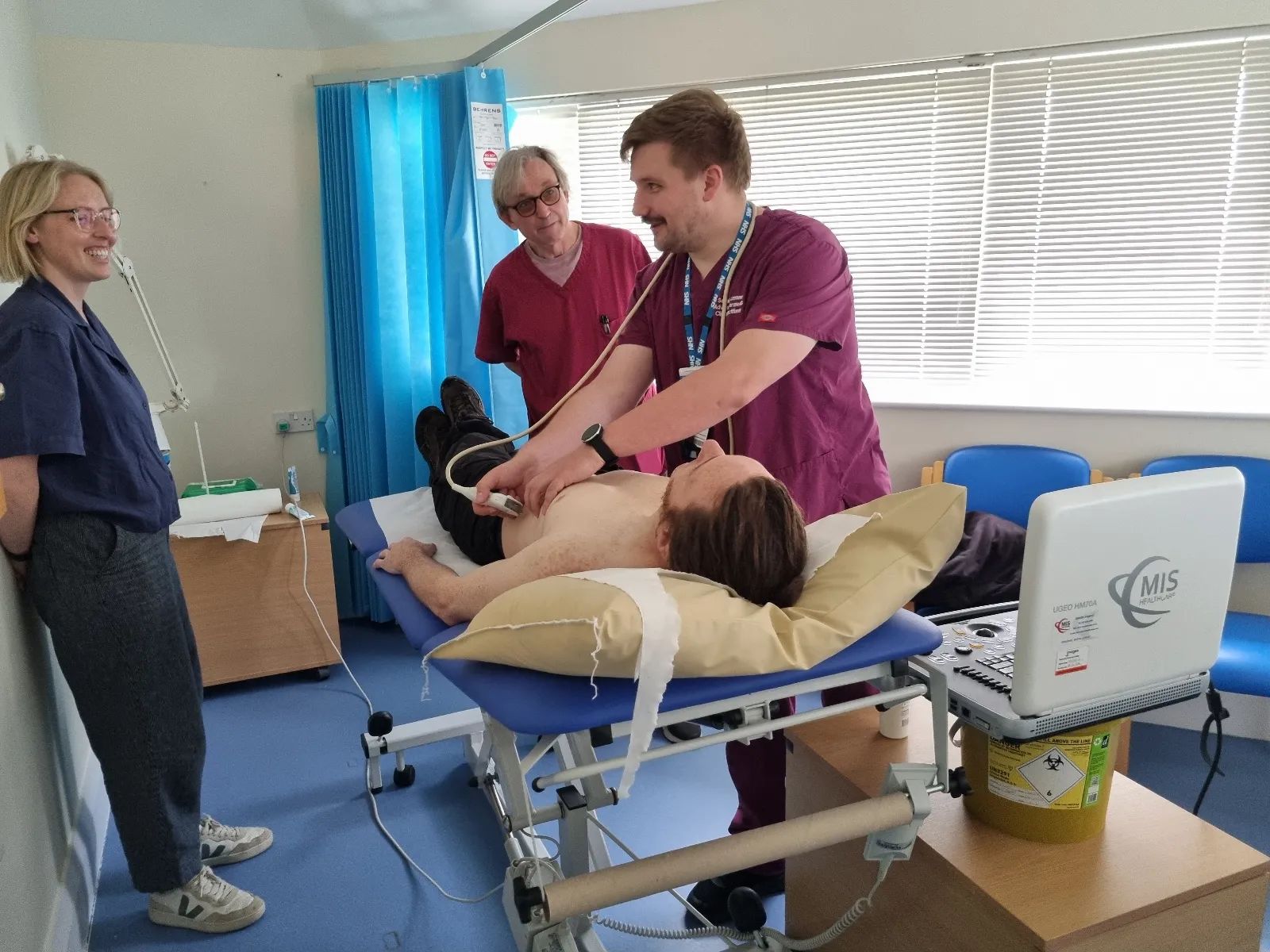
Key Features Driving POCUS Education
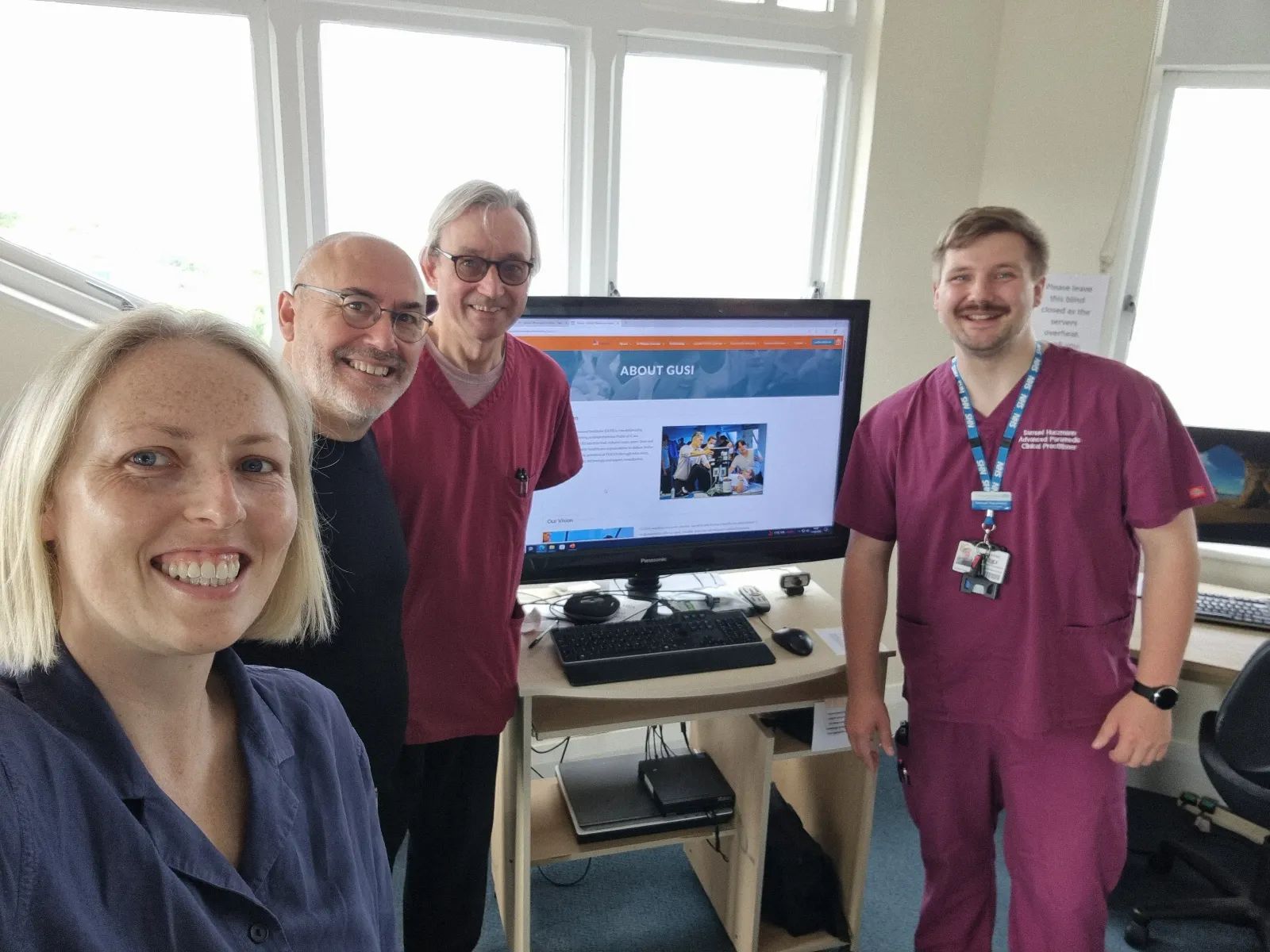
UpScan’s impact on medical education comes from a combination of thoughtful features. Here we highlight some key capabilities and how they enhance residency training:
- Structured Curriculum with Assignable Modules: ScanHub allows programs to integrate a ready-made POCUS curriculum (e.g. GUSI’s Essentials courses) into residency training . Instructors can assign specific modules or video lessons to complement clinical rotations – for instance, having interns complete an Ultrasound Basics module during orientation, or OB/GYN residents complete an obstetric ultrasound module before an obstetrics rotation. This structured, flipped-classroom model means residents come prepared with foundational knowledge, making hands-on scanning sessions more effective. Modules also include quizzes and self-assessments so learners can check their understanding. The flexibility of an online curriculum that residents “learn at their own pace” (as one Swedish program director noted) ensures no one is left behind .
- Performance Dashboards and Analytics: Both individuals and program leaders can access dashboards summarizing scan counts, completion of tasks, and competency metrics . For residents, seeing a tally of how many cardiac, lung, or FAST scans they’ve done can be highly motivating. It introduces a friendly competition and goals (e.g. “perform 10 cardiac echoes by end of month”). For faculty, the analytics identify trends: maybe the cohort is struggling with image quality on lung scans – indicating a need for a refresher session. UpScan’s dashboard can also benchmark performance against standards or peers , which helps ensure the residency meets national ultrasound education guidelines. Overall, these analytics foster a culture of improvement and accountability.
- Scan Archiving and Review (scanFolio): The platform’s scan portfolio (ScanVault) feature is transformative for feedback and competency tracking. Residents upload scans from actual patient encounters using the app, and later these can be reviewed during dedicated image review meetings or asynchronously. Faculty can log into ScanHub to see a resident’s recent uploads, add comments or “approve” scans that meet quality criteria. This facilitates a continuous feedback loop: a resident might upload an eFAST exam and within 24 hours get notes from an ultrasound faculty like “good view of Morison’s pouch, but next time increase depth to fully visualize the kidney.” By cataloguing all scans, the platform also creates a shared case library – residents learn not just from their own scans but also can view anonymized scans uploaded by peers (if permitted), exposing them to a wider variety of pathologies and normal variants. Such deliberate practice and feedback have been shown to significantly improve ultrasound interpretation skills in training.
- Hands-On Practice and Credentialing Support: One of the biggest challenges in learning ultrasound is getting enough hands-on practice. UpScan makes it easier to integrate practice into daily workflow. Residents can perform scans during rounds or clinic, then quickly save them to the cloud via ScanOne without worrying about cumbersome data transfer or violating privacy (the app strips patient identifiers) . This encourages more frequent scanning. The fact that each scan is logged means residents and faculty can keep track of numbers. When it comes time for credentialing (e.g. proving competency in ultrasound-guided procedures or diagnostic scans), the platform can generate reports of all scans performed, including pathology found and who reviewed it. This streamlines the credentialing sign-off process . Residents entering practice can show this portfolio to new employers to demonstrate their POCUS proficiency – a valuable career asset.
- Real-Time AI Assistance (SageAI): The inclusion of SageAI sets UpScan apart from traditional learning management systems. SageAI acts like a virtual tutor available round-the-clock. If a learner has a question – “How do I measure the abdominal aorta diameter on ultrasound?” or “What does a B-line indicate on lung ultrasound?” – SageAI can instantly provide an expert answer . This is especially useful during off-hours when attendings may not be immediately available. Furthermore, the AI is integrated with the content; for example, it can point the user to the relevant section of a course or offer tips in context. SageAI is also being used to provide immediate feedback on technique. As UpScan’s features indicate, the AI can analyze certain scan parameters (like probe orientation, image quality metrics) and give suggestions to improve in real time . While still evolving, this kind of just-in-time feedback significantly shortens the learning curve. Residents can correct mistakes on the fly rather than waiting for a later review session. In essence, SageAI helps residents learn by doing, with a safety net of expert knowledge guiding them.
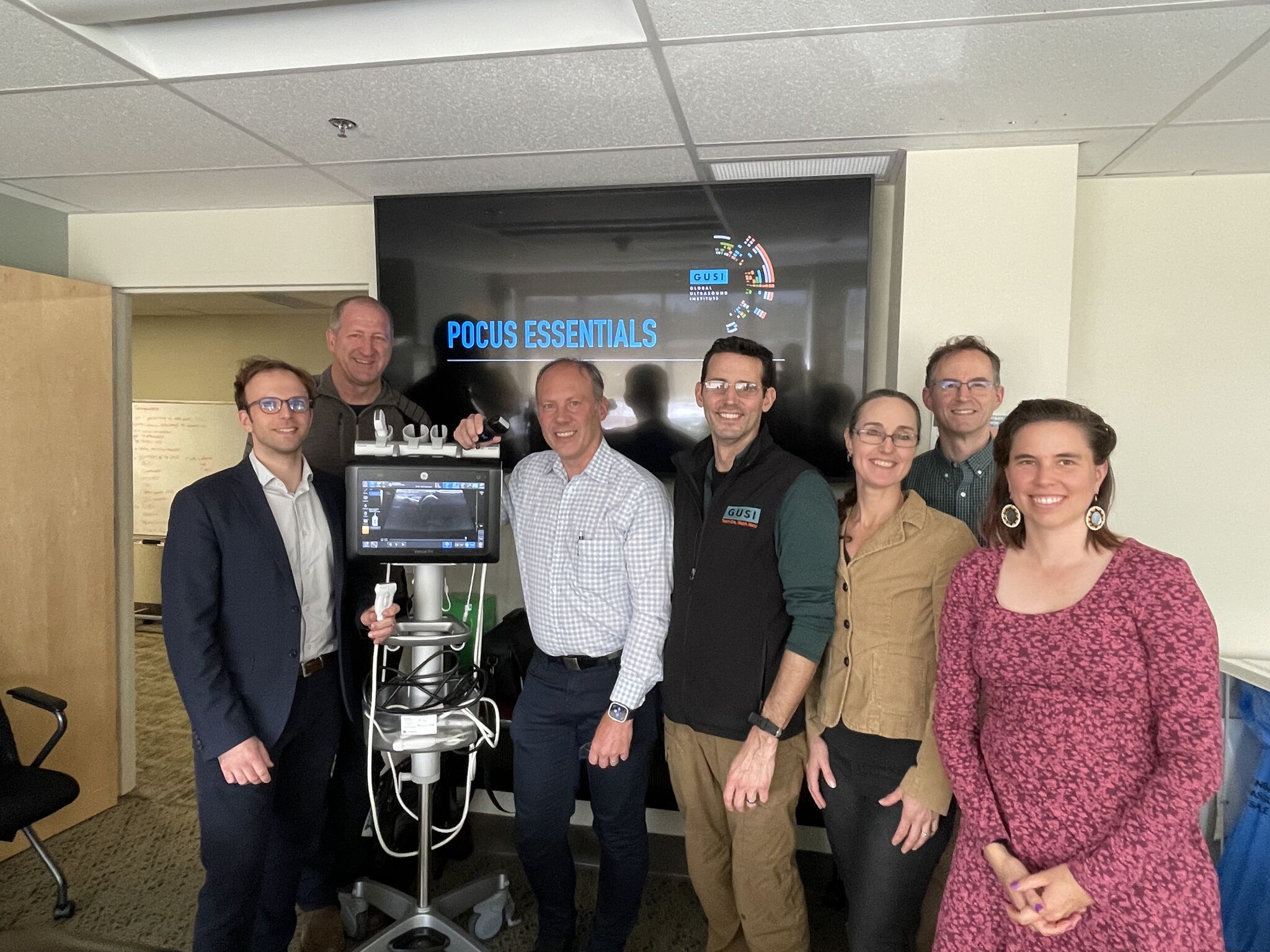
Extending Learning to In-Person Workshops
Another powerful application of the UpScan platform is its use in in-person group courses and workshops. Many residency programs and medical institutions host short POCUS bootcamps or regional courses (for example, a weekend ultrasound workshop for internal medicine residents, or a multi-day POCUS course for rural healthcare providers). UpScan’s tools ensure that the learning doesn’t end when the workshop does – participants continue to engage and refine their skills afterwards.
When GUSI runs an in-person course (such as those at Swedish Cherry Hill in Seattle or other partner sites), each participant is given access to ScanHub and ScanOne as part of the course package . During the workshop, they practice scans with instructor guidance; then, over the following weeks, they can upload their own scans via ScanOne for the instructors to review remotely. This blended learning approach combines the best of hands-on training with sustained mentorship. For instance, after an OB ultrasound course, an OB/GYN resident can continue scanning prenatal patients at their hospital and submit interesting cases or any scans they want checked. Faculty from the course (or local mentors) can provide feedback through the platform, effectively extending the workshop into an ongoing learning experience. ScanHub also gives these learners continued access to course materials, reference guides, and even recorded lectures if provided, so they can revisit topics as needed .
From an institutional perspective, UpScan’s Event Integration features allow linking specific workshops to the platform . A residency program might host an annual ultrasound training week – using UpScan, they can enroll all attendees into a temporary group where the week’s curriculum is outlined on ScanHub, pre- and post-course assessments are done online, and all scans from the week are collected in one place. After the event, that group can remain active for follow-up. This not only reinforces skills but also provides measurable outcomes: organizers can see improvements in quiz scores or track how many scans attendees perform in the months after the course as a measure of the course’s impact. In other words, UpScan ensures that in-person training is not a one-and-done event, but part of a continuous learning pipeline.
Conclusion
Ultrasound training is fast becoming a standard component of graduate medical education in the U.S., and platforms like UpScan are accelerating this evolution. By integrating assignable e-learning modules, a mobile scan upload app, cloud-based portfolios, and AI support, UpScan addresses the key needs of residency programs: education, practice, feedback, and verification. Early adopters such as Swedish Health and ECHN have demonstrated how embedding ScanHub into a curriculum can standardize POCUS education and empower residents to become confident in ultrasound usage . The result is residents who graduate with not only knowledge but proven hands-on skills, documented through their scan logs and assessments.
For medical educators and program directors, UpScan offers a turnkey solution to launch or enhance a POCUS program. It provides oversight tools like dashboards and compliance with training requirements, making the job of tracking learner progress much easier . And for learners – whether residents or attendees of a workshop – it creates an engaging, tech-enabled educational experience. They can learn theory online, apply it at the bedside with ScanOne, get instant AI and mentor feedback, and continually refine their skills. The platform’s widespread adoption in over 120 countries and hundreds of programs speaks to its effectiveness .
In summary, UpScan is transforming how ultrasound is taught by connecting the classroom to the bedside. As more residency programs and in-person courses embrace this platform, we can expect a new generation of clinicians for whom point-of-care ultrasound is second nature. The integration of tools like ScanHub, ScanOne, ScanVault, and SageAI ensures that these clinicians are not only skilled in using ultrasound, but are also lifelong learners – continually honing their craft with the help of smart technology and a global community of practice. UpScan is truly enhancing residency programs by making ultrasound education more accessible, trackable, and impactful than ever before.
Sources: The information in this article was drawn from the UpScan by GUSI platform details and case studies , as well as real-world examples of program integration in the United States. These sources highlight the features and benefits of ScanHub, ScanOne, ScanVault, and SageAI in medical training environments.
